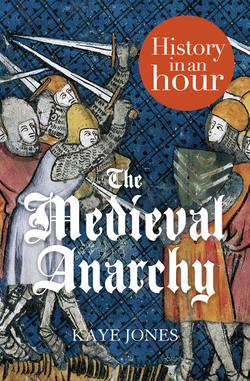Читать книгу The Medieval Anarchy: History in an Hour - Kaye Jones, Kaye Jones - Страница 7
ОглавлениеThe Succession Crisis
In the aftermath of William’s death, Henry’s attention naturally turned to the issue of the succession. In a last ditch attempt to procure a legitimate male heir, a second marriage was suggested to Adeliza of Louvain. Young and attractive, it was hoped that she would quickly conceive a son. The marriage took place at Windsor Castle on 29 January 1121, with Adeliza’s coronation carried out the following day.
Queen Adeliza
In the meantime Henry looked to his immediate family for a possible heir to his throne, should his plans for a son by Adeliza fail. Although he had other children, their illegitimacy ruled them out as potential candidates, though he had a particular fondness for the eldest, Robert, Earl of Gloucester. He had nephews too to consider. Stephen of Blois, for instance. After all, Stephen had been living in his household for several years and had already demonstrated impressive military and political skills on a previous trip to Normandy.
But William Adelin was not Henry’s only legitimate child. So far unconsidered, Matilda, now Empress of the Holy Roman Empire, was Henry’s first-born and had the strongest claim among his family. Henry had not seen Matilda since 1110 when she had left England to marry Henry V, the Holy Roman Emperor. The marriage was childless and Matilda, widowed in 1125, was left with a rather uncertain future. Now, in 1126, Henry wondered if she might provide a solution to the succession problem. He called on his daughter to join him in Normandy, no doubt to get better acquainted, and, quite possibly, to discuss the realm’s future.
Henry V and the Empress Matilda
Henry also took some time to discuss Matilda’s suitability with his leading barons and advisers. In general they were uneasy about Matilda succeeding her father. After all, there was no precedent of female governance in England. In an era where the role of monarch encompassed politician and soldier, the unsuitability of women for such a position was a sentiment echoed by many. King David of Scotland, the brother of Henry’s late wife, and Robert, Earl of Gloucester, however, both spoke out in favour of Matilda and it was to these men that Henry listened. Thus, in January 1127, Henry named Matilda as his heir and invited the leading clergymen and barons of the realm to swear an oath of fealty to her, supporting her succession to the throne of England and the Duchy of Normandy.
In the meantime Henry arranged a second marriage for Matilda. The chosen groom was Geoffrey, a fourteen-year-old, who would become the Count of Anjou on his father’s death in 1129. The pair were married on 17 June 1128, in the French town of Le Mans. Shortly after the wedding, Henry once again called on his barons to swear an oath of fealty to Matilda, suggesting that he may have doubted their faithfulness. As Matilda had just married into the House of Anjou, the historic enemy of the Normans, the barons disliked the idea that Geoffrey might rule them in one capacity or another after Henry’s death. But, in 1131, Henry acted to make it clear that Matilda was his heir. For a third time, he called on his barons and clergy to swear an oath of fealty to his daughter.
The marriage between Matilda and Geoffrey turned sour soon after the wedding, but Henry was able to reconcile the couple and was soon rewarded with the arrival of grandsons. The first, Henry, was born on 5 March 1133, while the second, Geoffrey, appeared on 1 June 1134. In between the births, Henry had embarked on his final voyage across the Channel to Normandy. While on a hunting trip in November 1135, he fell ill after eating lampreys, his favourite food. An eel-like fish, lampreys were a popular delicacy in the Middle Ages, though Henry had been advised by his physician never to eat them. Surrounded by friends and family, including his illegitimate son, Robert, Earl of Gloucester, Henry made his last confession and received the last rites. If William of Malmesbury is to be believed, Henry also asked those present to accept Matilda as heir to England and Normandy. He then passed away on 1 December 1135.
